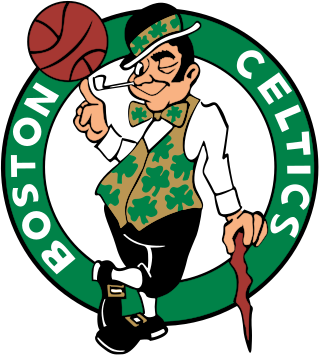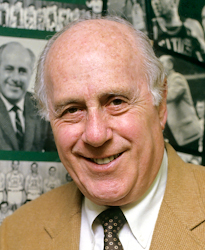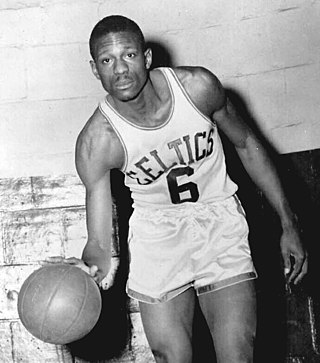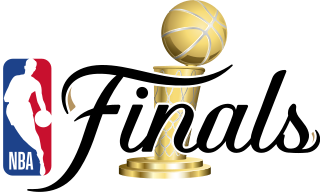
The Boston Celtics are an American professional basketball team based in Boston. The Celtics compete in the National Basketball Association (NBA) as a member of the Atlantic Division of the Eastern Conference. Founded in 1946 as one of the league's original eight teams, the Celtics play their home games at TD Garden, a shared arena with the NHL's Boston Bruins. The Celtics are commonly regarded as the most successful team in NBA history and hold the records for most NBA championships won, with 18, and most recorded wins of any NBA franchise.

Wilton Norman Chamberlain was an American professional basketball player. Standing 7 ft 1 in (2.16 m) tall, he played center in the National Basketball Association (NBA) for 14 seasons. Often regarded as the greatest basketball player of all time, Chamberlain was enshrined in the Naismith Memorial Basketball Hall of Fame in 1978 and elected to the NBA's 35th, 50th, and 75th anniversary teams. Following his professional basketball career, Chamberlain played volleyball in the short-lived International Volleyball Association (IVA). He served one term as league president and is enshrined in the IVA Hall of Fame.

Arnold Jacob "Red" Auerbach was an American professional basketball coach and executive. He served as a head coach in the National Basketball Association (NBA), most notably with the Boston Celtics. Auerbach was also the head coach of the Washington Capitols and Tri-Cities Blackhawks. As a coach, Auerbach set NBA records with 938 wins and nine championships. After his coaching retirement in 1966, he served as president and front office executive of the Celtics until his death. As general manager and team president of the Celtics, he won an additional seven NBA titles for a total of 16 in a span of 29 years, the most of any individual in NBA history, making him one of the most successful team officials in the history of North American professional sports.

William Felton Russell was an American professional basketball player who played center for the Boston Celtics of the National Basketball Association (NBA) from 1956 to 1969. He was the centerpiece of the Celtics dynasty that won 11 NBA championships during his 13-year career. Russell is widely considered to be one of the greatest basketball players of all time.

The NBA Finals is the annual championship series of the National Basketball Association (NBA). The Eastern and Western Conference champions play a best-of-seven series to determine the league champion. The team that wins the series is awarded the Larry O'Brien Championship Trophy, which replaced the original Walter A. Brown Trophy in 1976–77, though under the same name until 1984.

John Joseph Havlicek was an American professional basketball player who spent his entire career with the Boston Celtics of the National Basketball Association (NBA).

The 76ers–Celtics rivalry is a National Basketball Association (NBA) rivalry between the Philadelphia 76ers and the Boston Celtics. The two teams have the most meetings in the NBA playoffs, playing each other in 22 series, with the Celtics winning 15 of them. The 76ers are considered to be the Celtics' second biggest rival, behind only the Los Angeles Lakers.

The 1969 NBA World Championship Series to determine the champion of the 1968–69 NBA season was played between the Los Angeles Lakers and Boston Celtics. The Lakers were heavily favored due to the presence of three formidable stars: Elgin Baylor, Wilt Chamberlain, and Jerry West. In addition, Boston was an aging team; they made the playoffs as the fourth place team in the Eastern Division, and were not favored to make it to the finals. The Celtics won the championship in seven games – the last championship of the Bill Russell dynasty – and is considered one of the great upsets in NBA history. The Celtics became the first team in NBA history to overcome a 2–0 series deficit to win the championship.
The 1968–69 NBA season was the 23rd season of the National Basketball Association. The season ended with the Boston Celtics winning the NBA Championship, beating the Los Angeles Lakers 4 games to 3 in the NBA Finals.
The 1967–68 NBA season was the 22nd season of the National Basketball Association. The season ended with the Boston Celtics winning the NBA Championship, beating the Los Angeles Lakers 4 games to 2 in the NBA Finals.
The 1976 NBA World Championship Series was the championship round for the National Basketball Association (NBA)'s 1975–76 season, and the culmination of the season's playoffs. The Eastern Conference champion Boston Celtics defeated the Western Conference champion Phoenix Suns 4 games to 2 to win their 13th NBA Championship. Celtics point guard Jo Jo White was named as the series MVP.
The 1966–67 NBA season was the 21st season of the National Basketball Association. The season ended with the Philadelphia 76ers winning the NBA Championship, beating the San Francisco Warriors 4 games to 2 in the NBA Finals, ending the Boston Celtics' record title run at 8.
The 1965–66 NBA season was the 20th season of the National Basketball Association. The season ended with the Boston Celtics winning an unprecedented 8th straight NBA Championship, beating the Los Angeles Lakers 4 games to 3 in the 1966 NBA Finals.
The 1964–65 NBA season was the 19th season of the National Basketball Association. The season ended with the Boston Celtics winning their 7th straight NBA Championship, beating the Los Angeles Lakers 4 games to 1 in the NBA Finals.
The 1963–64 NBA season was the 18th season of the National Basketball Association. The season ended with the Boston Celtics winning their 6th straight NBA Championship, beating the San Francisco Warriors 4 games to 1 in the NBA Finals.

Bailey E. Howell is an American former professional basketball player. After playing college basketball at Mississippi State, Howell played 12 seasons in the National Basketball Association (NBA). Howell was a six-time NBA All-Star, two-time NBA champion and was inducted into the Naismith Memorial Basketball Hall of Fame in 1997.
The 1981 NBA playoffs were the postseason tournament of the National Basketball Association's 1980–81 season. The tournament concluded with the Eastern Conference champion Boston Celtics defeating the Western Conference champion Houston Rockets 4 games to 2 in the NBA Finals. Cedric Maxwell was named NBA Finals MVP.
The 1964–65 NBA season was the Celtics' 19th season in the NBA. The Celtics finished the season by winning their eighth NBA Championship, defeating the Los Angeles Lakers in five games. In 1996, the team was named one of the 10 greatest teams in NBA history. In addition five players were inducted into the Hall of Fame - K. C. Jones, Sam Jones, Tom Heinsohn, Bill Russell, and John Havlicek. Sam Jones, Havlicek, and Russell were selected as among the NBA's 50 greatest players. Both Red Auerbach and John Thompson were elected into the Hall of Fame as coaches.
The 1965–66 Boston Celtics season was their 20th in the National Basketball Association (NBA).
The 1964–65 NBA season was the 76ers 16th season in the NBA and 2nd season in City Philadelphia. The team made a major trade to obtain the services of Wilt Chamberlain during the middle of the season. In the playoffs, they took the Boston Celtics to a 7th and decisive game. With the Sixers down 110-109 & only 5 seconds on the clock, Hal Greer inbounded the ball, and John Havlicek made a play for the ages when he stole the inbound pass, and the Celtics went on to win the game, and eventually their 7th consecutive championship.









